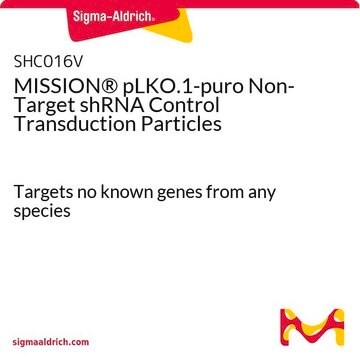H9268
Hexadimethrine bromide
≥94% (titration)
Synonym(s):
1,5-Dimethyl-1,5-diazaundecamethylene polymethobromide, Polybrene
About This Item
Recommended Products
Assay
≥94% (titration)
storage temp.
2-8°C
InChI
1S/C10H24N2.C3H6Br2/c1-11(2)9-7-5-6-8-10-12(3)4;4-2-1-3-5/h5-10H2,1-4H3;1-3H2
InChI key
KZKAYEGOIJEWQB-UHFFFAOYSA-N
Looking for similar products? Visit Product Comparison Guide
General description
Application
Hexadimethrine bromide has been used for lentivirus infection in cells. It has been used for infection of cells with retroviral supernatant.
related product
Signal Word
Warning
Hazard Statements
Precautionary Statements
Hazard Classifications
Acute Tox. 4 Oral
Storage Class Code
11 - Combustible Solids
WGK
WGK 3
Flash Point(F)
Not applicable
Flash Point(C)
Not applicable
Personal Protective Equipment
Certificates of Analysis (COA)
Search for Certificates of Analysis (COA) by entering the products Lot/Batch Number. Lot and Batch Numbers can be found on a product’s label following the words ‘Lot’ or ‘Batch’.
Already Own This Product?
Find documentation for the products that you have recently purchased in the Document Library.
Customers Also Viewed
Articles
Small interfering RNAs (siRNAs) are powerful tools for gene expression knockdown, widely used in molecular biology.
Small interfering RNAs (siRNAs) are powerful tools for gene expression knockdown, widely used in molecular biology.
Small interfering RNAs (siRNAs) are powerful tools for gene expression knockdown, widely used in molecular biology.
Small interfering RNAs (siRNAs) are powerful tools for gene expression knockdown, widely used in molecular biology.
Protocols
Detailed procedure for how to perform a lentiviral transduction of MISSION shRNA lentiviral particles to achieve a stable long term silencing and phenotypic change.
Lentivirus versions of genome modification technologies support successful CRISPR, RNAi, and ORF experiments.
Lentivirus versions of genome modification technologies support successful CRISPR, RNAi, and ORF experiments.
Lentivirus versions of genome modification technologies support successful CRISPR, RNAi, and ORF experiments.
Our team of scientists has experience in all areas of research including Life Science, Material Science, Chemical Synthesis, Chromatography, Analytical and many others.
Contact Technical Service













